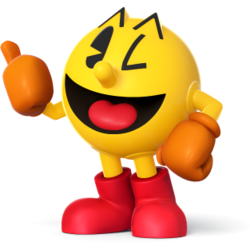Pac-Man (SSB4): Difference between revisions
m (→Trivia) |
Guybrush20X6 (talk | contribs) |
||
| Line 36: | Line 36: | ||
Pac-Man Image 2.jpg|Pac-Man with {{SSB4|Mario}}, Sonic, and Mega Man. | Pac-Man Image 2.jpg|Pac-Man with {{SSB4|Mario}}, Sonic, and Mega Man. | ||
Pac-Man Image 3.jpg|Pac-Man and {{SSB4|Zero Suit Samus}}. | Pac-Man Image 3.jpg|Pac-Man and {{SSB4|Zero Suit Samus}}. | ||
Pac-Man Image 4.jpg | Pac-Man Image 4.jpg|Pac-Man in his classic form that the uses for certain attacks. | ||
Pac-Man Image 5.jpg|Namco Roulette with {{SSB4|Kirby}}. | Pac-Man Image 5.jpg|Namco Roulette with {{SSB4|Kirby}}. | ||
Pac-Man Image 6.jpg | Pac-Man Image 6.jpg | ||
Revision as of 10:44, July 26, 2014
| Pac-Man in Super Smash Bros. 4 | |
|---|---|
 
| |
| Universe | Pac-Man |
| Final Smash | Super Pac-Man |
| “ | PAC-MAN Hungers for Battle! | ” |
| —Introduction Tagline | ||
Pac-Man (パックマン, Pakkuman) has been confirmed to be a newcomer in Super Smash Bros. 4, first shown on June 10th to attendees of the E3 2014 Smash Bros. Roundtable and later confirmed to the public on Nintendo of America's Twitter account.[1] His abilities involve throwing fruits at other fighters and eating power pellets, along with basic punching and kicking abilities for close-range moves.[2] He is noted within the trailer for being, along with Mr. Game & Watch, among the oldest characters in the game, first appearing in 1980 (earlier than Mario's debut in Donkey Kong). While Pac-Man is introduced in his classic "wedge" shape, within the game he mostly takes his 3D "ball" form that appeared in game cabinet artwork and advertising but first appeared in-game in the Japanese version of Pac-Land.
Moves
- Bonus Fruit, a move where he summons 8-bit fruit, and Galaxian Starships. This has been confirmed to be his neutral special. [3]
- A move where he turns into his ball form and chomps on a chain of pac-dots. The player appears to be able to control the path of the dots, therefore controlling the direction of the move.
- A move where he spawns a Fire Hydrant that shoots water with a push effect. It can also be launched with an attack into players.
- A jab consisting of two punches followed by a kick.
- His up air appears to be the aerial flip kick from Pac-Man World 2.
- Turns into his ball form and dashes forward, possibly a dash attack.
- Multiple moves that spawn 8-bit ghosts, likely his smash attacks.
- A move where a tractor beam similar to the one used by the Galagan Bugs is emitted from Pac-Man's hand.
- A move where Pac-Man spawns a trampoline from the Namco game Mappy that can be bounced on by other players, similarly to Sonic's Spring Jump and Mega Man's Rush Coil. The trampoline will remain where it was spawned, even in midair, and will change color from blue to yellow to red each time it is used. If the trampoline is red when it is used, it will break and the player will enter a helpless state as they fall.
- Namco Roulette, an up taunt where he summons classic Namco items, characters, and enemies, similar to Bonus Fruit, including those from Galaga, Mappy, Dig Dug, and Xevious.
- A move, most likely a directional final smash, where Pac-Man turns into a giant 2-D version of his 8-bit form and goes straight forward.
- Pac-Man can wall jump. [4]
Trailer
<youtube>dVz-2VuAYlY</youtube>
Gallery
Pac-Man with Mario, Sonic, and Mega Man.
Pac-Man and Zero Suit Samus.
Namco Roulette with Kirby.
Pac-Man kicking a Pooka.
Pac-Man and Mario on the Pac-Maze stage.
Pac-Man's neutral special move, Bonus Fruit.
Trivia
- Red, Blue, Yellow (Pac-Man's trailer) is the first newcomer trailer that shows footage of the 3DS version.
- Pac-Man is the oldest third-party character to appear in a Super Smash Bros. game, beating out the next oldest, Solid Snake, by seven years.
- Overall, he is the second oldest Super Smash Bros. character, as his debut was one month (in Japan; 6 months in North America) after Mr. Game & Watch's debut.
References
| Fighters in Super Smash Bros. 4 | |
|---|---|
| Veterans | Bowser · Captain Falcon · Charizard · Diddy Kong · Donkey Kong · Dr. Mario · Falco · Fox · Ganondorf · Ike · Jigglypuff · King Dedede · Kirby · Link · Lucario · Lucas · Luigi · Mario · Marth · Meta Knight · Mewtwo · Mr. Game & Watch · Ness · Olimar · Peach · Pikachu · Pit · R.O.B. · Roy · Samus · Sheik · Sonic · Toon Link · Wario · Yoshi · Zelda · Zero Suit Samus |
| Newcomers | Bayonetta · Bowser Jr. · Cloud · Corrin · Dark Pit · Duck Hunt · Greninja · Little Mac · Lucina · Mega Man · Mii Fighter (Mii Brawler · Mii Gunner · Mii Swordfighter) · Pac-Man · Palutena · Robin · Rosalina & Luma · Ryu · Shulk · Villager · Wii Fit Trainer |
|
| |
|---|---|
| Fighter | Pac-Man (SSB4 · SSBU) |
| Assist Trophy | Ghosts |
| Stages | Pac-Maze · Pac-Land |
| Trophies and Spirits | Trophies · Spirits |
| Music | SSB4 · Ultimate |
| Masterpiece | Pac-Man |















